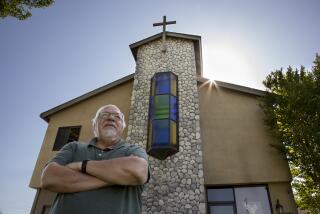The Armstrongs and Their Churches--Thriving on Controversy
- Share via
The Pasadena-based Worldwide Church of God has been out of the major headlines for the last several years since it emerged from state-imposed receivership resulting from charges of financial irregularities. But things have not been quiet.
Last year, the church lost a $1.26-million libel and slander suit (now under appeal) filed by the former wife of the church patriarch. Herbert W. Armstrong, 92, the church founder, divorced his second wife, Ramona, 45, after seven years of marriage in a bitter litigation that reportedly cost the church more than $5 million in legal fees.
Still, the church and the Armstrong family seem to thrive on controversy: The church is bigger and wealthier than ever, according to church-published reports and interviews.
“Everything is moving ahead very powerfully and well; everything is very productive,” Ellis La Ravia, press secretary for the church and its Ambassador College, said this week. He noted that the church’s 78,000 baptized members represent a 5% gain over a year ago.
Son Expands Church
Meanwhile, Garner Ted Armstrong, 54, the silver-haired and silver-tongued son who was ousted from the Worldwide Church by his father during a family squabble in 1978, is expanding his own breakaway Church of God International in Tyler, Tex., where he broadcasts a cable TV show now reaching 350 U.S. cities.
“I couldn’t be happier,” said an ebullient Garner Ted on a recent visit to Pasadena, where he did not see his ailing father. “If we were growing any faster, it would be frenetic.” The Church of God International has 55 ordained ministers serving 75 congregations with a budget of $1.3 million, he said.
Growth of the Worldwide Church of God slowed during the late 1970s and early 1980s, amid sweeping defections, personnel shake-ups and continued allegations of misconduct after the accusations of several former members in early 1979 that Herbert Armstrong, then-Treasurer Stanley Rader and other leaders had siphoned off millions in church funds for personal use.
The allegations were never proved and the charges were dismissed after a 1980 law stripped the state attorney general of power to investigate religious organizations in such cases.
Church membership, listed at 70,680 in 1982, has risen now to an all-time high of more than 78,000 in 725 congregations in 56 countries, matched by a record 1984 income of about $150 million, La Ravia said. The church operates a 350-student junior college in Big Sandy, Tex., as well as the 725-student, four-year unaccredited Ambassador College on its lavish Pasadena campus, and the education- and culture-oriented Ambassador Foundation.
Despite failing eyesight and reduced vigor, Herbert Armstrong still jets around the world in the church’s white, gold and purple Grumman Gulfstream G-III airplane (new this year at a cost of about $14 million) to visit dignitaries and heads of state. His latest trip was a five-week excursion in November and December to Nepal, Sri Lanka, China, Japan, Bangladesh and Thailand.
“Mr. Armstrong’s religious message is who and what God is, who and what Satan is, the purpose of human life, why civilization as we know it exists and why it is in the condition it is, the truth about Judah and Israel (prophecy about Bible lands), the purpose of the church, and the hope of the kingdom of God,” La Ravia said during an interview.
The Worldwide Church of God, incorporated in California in 1947, is a blend of Christian fundamentalism with non-Trinitarian and Seventh-day Sabbath (Saturday worship) doctrine. Herbert Armstrong is considered to be God’s chosen apostle of the only true church. Members are taught to tithe (give 10%)--and even double- and triple-tithe--their income to the church and its projects.
“A $150-million budget may seem like a lot at first,” explained La Ravia, “but that includes many free services to the public,” including an estimated 35 million pieces of literature sent out in 1984. And, he added, air time for Herbert Armstrong’s weekly television program, broadcast on 425 stations worldwide (265 in the United States) is “an enormous expense.”
Shortly after Herbert Armstrong flew on the maiden flight of the newly purchased jet in late August, his letter to “brethren and co-workers” (contributors) warned that “in the past two months we have gone considerably over budget, and cash reserves are at dangerous levels.”
Employees were told that the church and college were having difficulty meeting payroll, and some expenses were deferred. But a report by church Treasurer Leroy Neff nonetheless spotlighted an overall increase of 16% in annual church giving by the end of Notember.
Despite the apparent financial and numerical growth of the Worldwide Church, Garner Ted Armstrong said that “disfellowshipping” (excommunication) of members by the hierarchy was continuing on a frequent basis.
‘Feeling of Turnover’
“The feeling I get is not one of growth, but of turnover,” said the younger Armstrong, who preached at year’s end in the Church of God International congregation in Pasadena pastored by his brother-in-law, David Antion, a former Worldwide Church of God executive. About 90% of the 100 members of Antion’s church are ex-Worldwide Church members, Ted Armstrong noted.
Recently, a Worldwide Church of God leader and college professor was fired and ousted from the church for writing a book on organizational commitment. George T. Geis, associate professor of business administration at Ambassador College, co-authored “The Firm Bond,” which uses a composite case-study approach to applying principles of religious commitment to the business world.
Soon after the book, published in October, appeared in Vroman’s bookstore in Pasadena--where it is enjoying brisk sales--Geis was called in by Worldwide authorities and asked to submit his resignation. Apparently, according to Ted Armstrong, “people (church leaders) thought they saw themselves in the book.” The Worldwide Church of God is not mentioned in the book, nor does it reveal the connection of either Geis or co-author Robert Kuhn, a former top Worldwide official who has also been disfellowshipped, with the church or college.
Personal Meaning
“ ‘The Firm Bond’ is about commitment in business and religion, how individuals and institutions can build it and how can they can avoid breaking it,” Kuhn, now a senior fellow in Creative and innovative management at the University of Texas, said in a carefully worded response to a reporter’s questions about Geis’ firing. “The meaning and intent of the book is clear and important, in both business and religion.”
A section of the book (Praeger, $21.95) deals with personal meaning and entrepreneurial drives within an unaccommodating structure. “How does one deal with such people and pressures?” the authors ask.
“The easy answer--get rid of them!--deprives the company of innovative potential. On the other hand, strategies that allow for the expression of such needs promote mutual benefit for employee and organization.”
“The resignation was his (Geis’) choice; the book was something he chose to write,” said La Ravia, the Worldwide Church press secretary, who would not explain the reasons for the dismissal.
Geis, who is Research Coordinator of the Center for Human Resources Management at UCLA, would not comment on the ironic turn of events.
More to Read
Sign up for Essential California
The most important California stories and recommendations in your inbox every morning.
You may occasionally receive promotional content from the Los Angeles Times.













